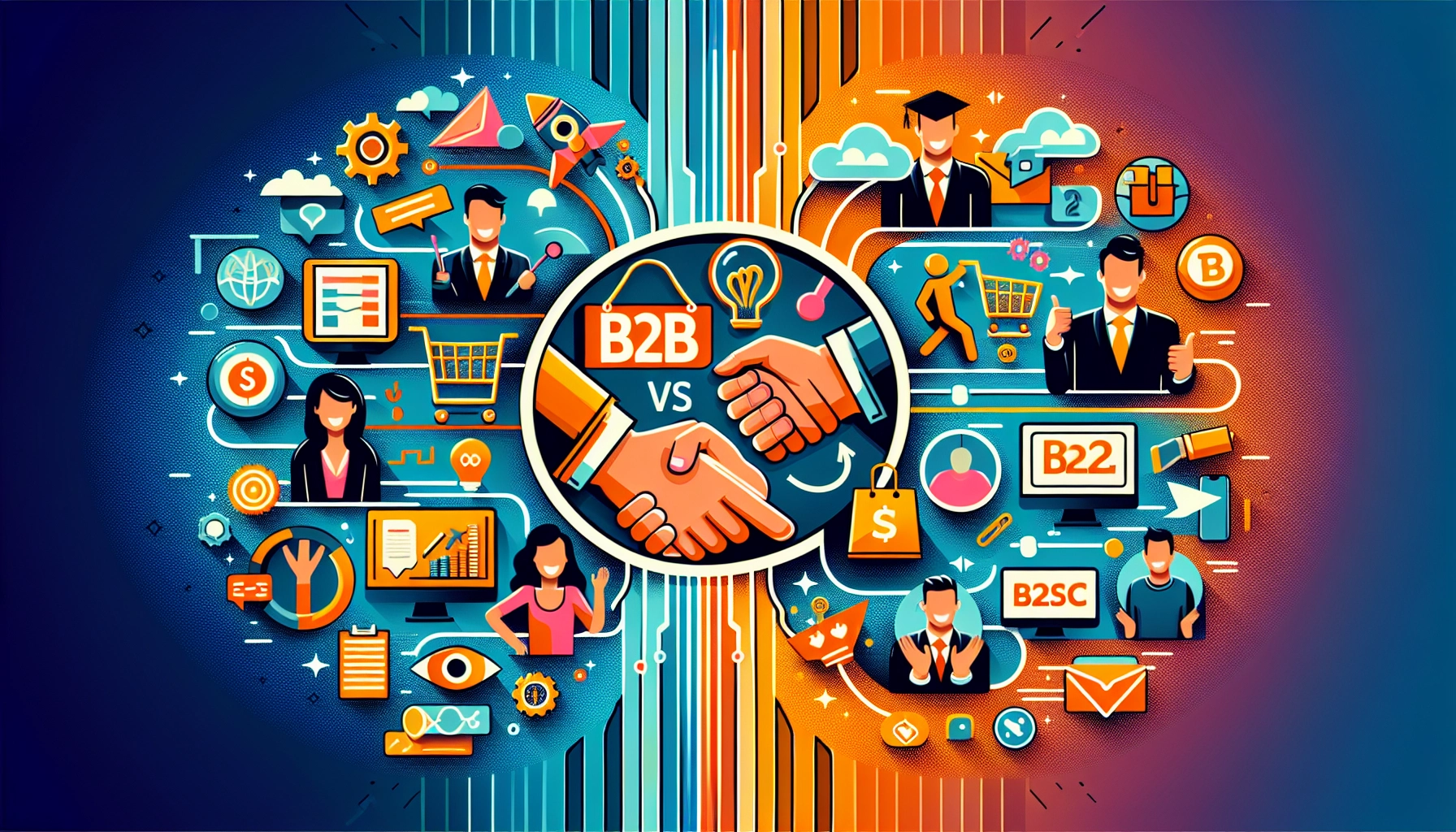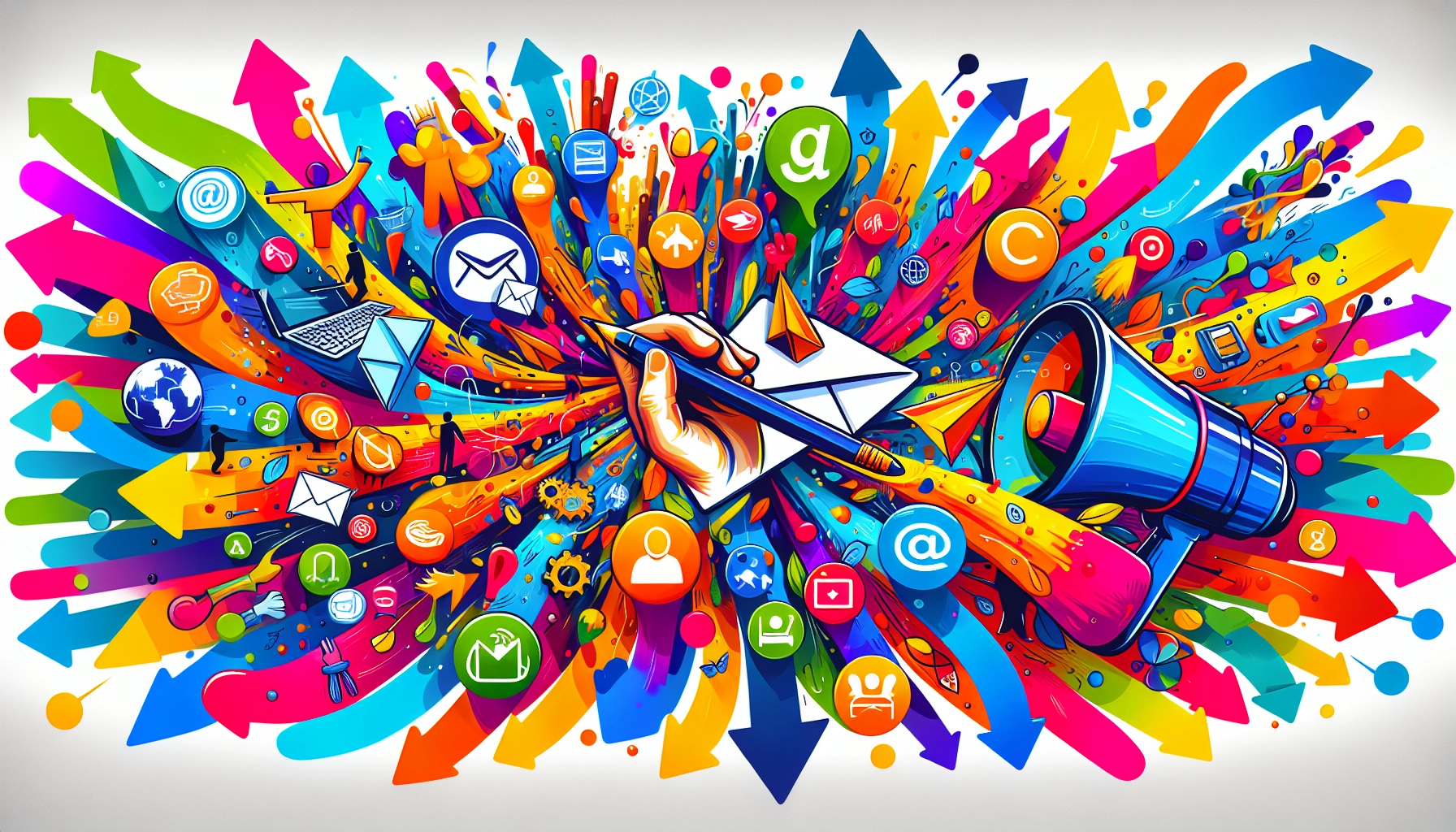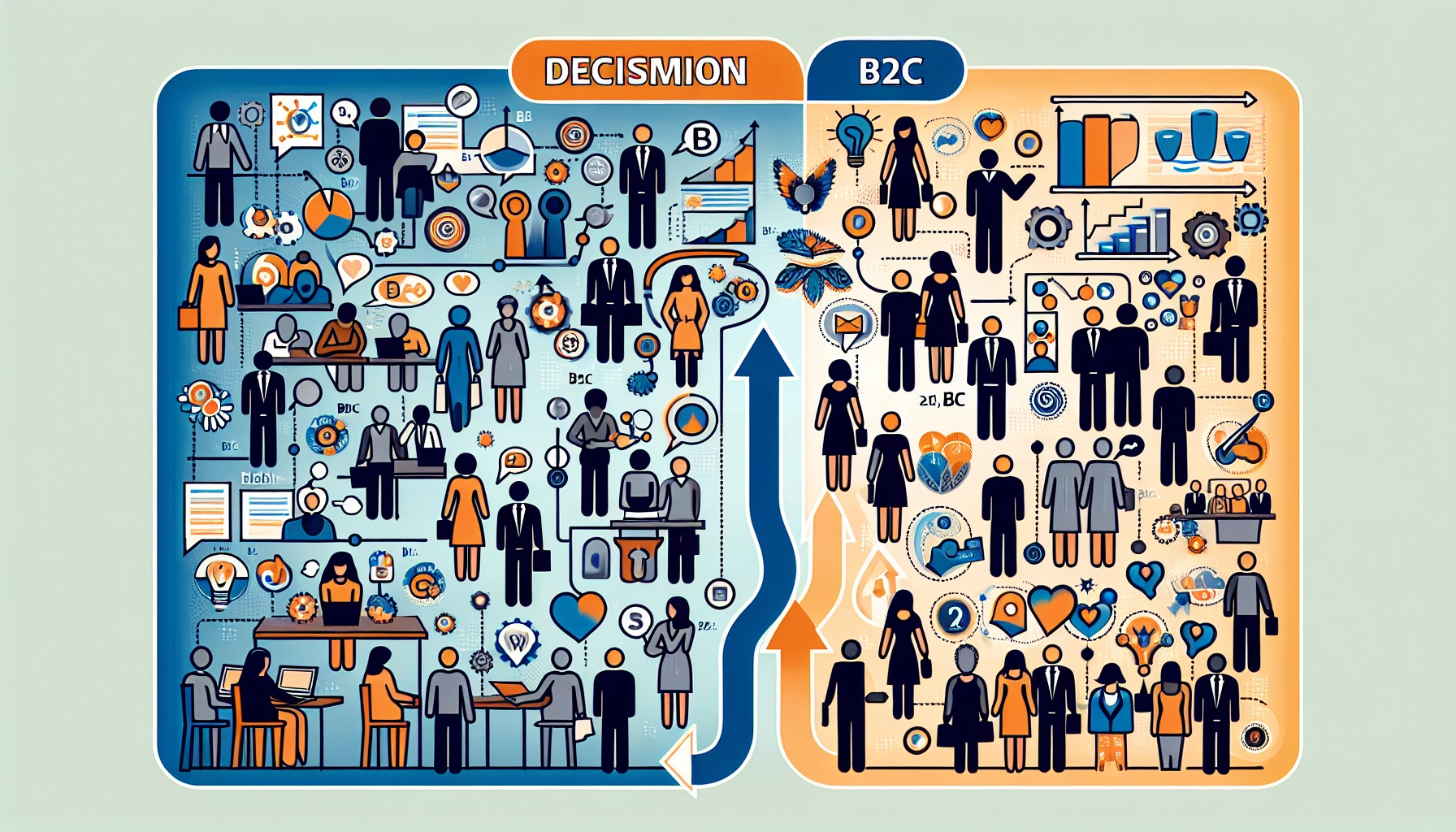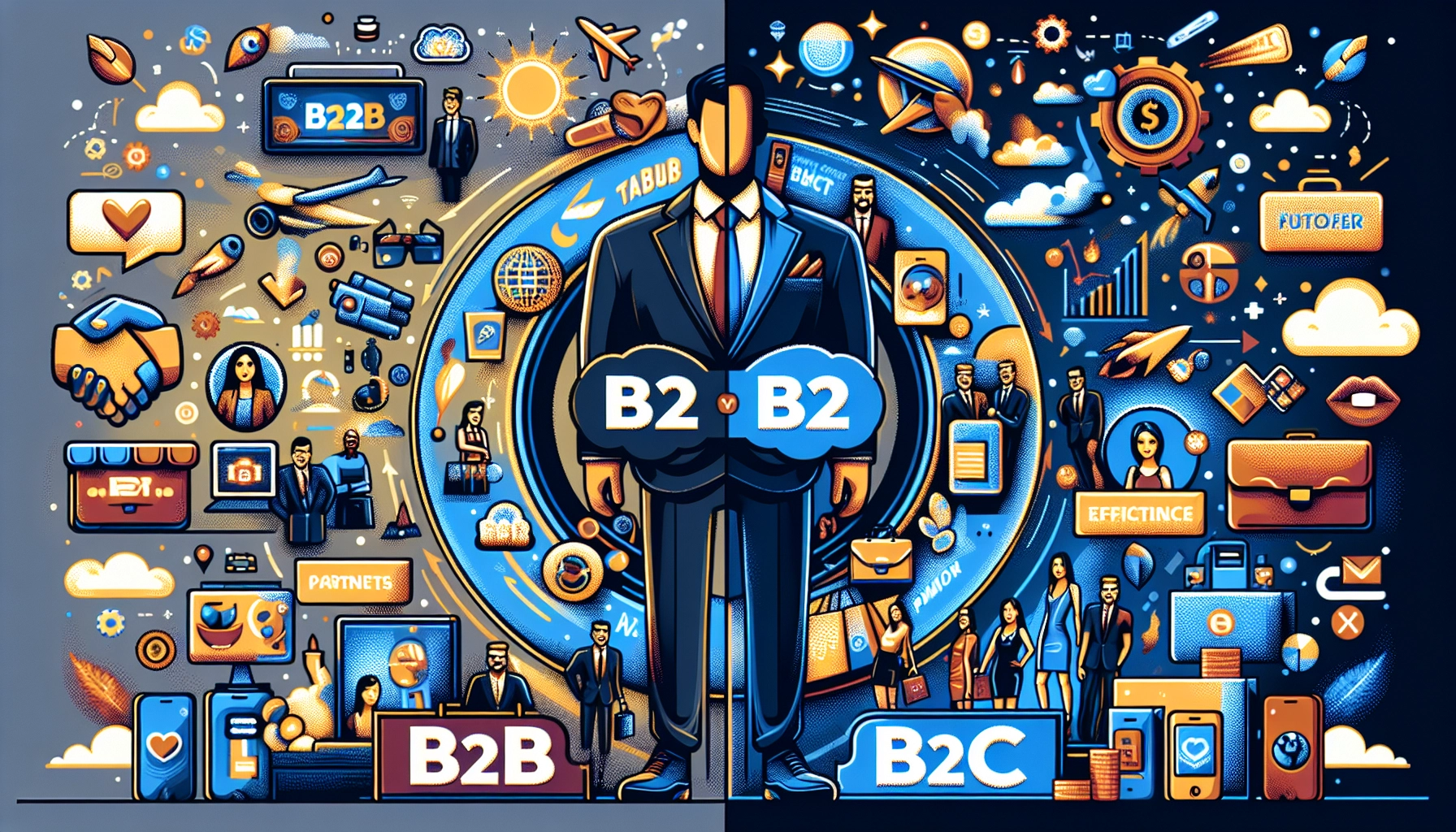Table of Contents[Hide][Show]
- Core Insights
- Summary
Frequently Asked Questions+−
- What is the primary difference between B2C and B2B marketing?
- Why are B2B sales cycles typically longer than B2C sales cycles?
- How do influencer marketing strategies differ between B2B and B2C?
- What role does content marketing play in B2C vs B2B?
- Why is it important to optimize ecommerce platforms differently for B2B and B2C?
Are you curious about B2B vs B2C? B2B, or business-to-business, involves transactions between companies, while B2C, or business-to-consumer, deals with businesses selling directly to consumers. This article breaks down their key distinctions in strategy, sales cycles, and customer relationships so you can decide which model best suits your business and learn how to attract customers effectively.
Core Insights
- B2B transactions focus on building long-term relationships and addressing the needs of organizations, while B2C transactions prioritize immediate consumer satisfaction and emotional engagement.
- Marketing strategies differ significantly. A successful B2B strategy prioritizes detailed content and relationship-building, whereas B2C strategies emphasize emotional appeal and quick sales through broad-reaching tactics.
- The sales cycle in B2B is longer and involves multiple stakeholders, contrasting with the shorter, more straightforward decision-making process in B2C, which is typically driven by personal emotions.
Understanding B2B and B2C

Business to Business (B2B) is transactions between companies, products, or services that other businesses need. Business to Consumer (B2C) is transactions between businesses and individual consumers, products for the average consumer. B2B marketing targets other businesses focusing on building long-term relationships, while B2C targets understanding and meeting individual consumers’ immediate needs and desires.
Across all USA businesses, for every B2C company, there are 1.6 B2B companies. However, many businesses operate in both B2B and B2C, using their strengths to maximize profit and market reach. For example, a company might sell industrial equipment to other businesses and consumer-grade products to individuals. These businesses actively work to sell products that cater to both markets.
B2B is about building relationships and business values, while B2C is about sales through customer experience and brand loyalty. It all depends on your background, expertise, and business objectives.
Understanding Business Models
Definition of B2B (Business to Business)
B2B, or Business-to-business, refers to a business model where a company sells products or services to other businesses. This type of transaction typically involves a more complex sales process, as it often requires building relationships with multiple stakeholders and understanding the specific needs of the business customer. B2B businesses frequently focus on providing value to their customers through expertise, reliability, and personalized service. The goal is to create long-term partnerships that benefit both parties, ensuring that the products or services offered meet the specific demands of other businesses.
Definition of B2C (Business to Consumer)
B2C (Business to Consumer) is a business model where a company sells products or services directly to individual consumers. This type of transaction typically involves a more straightforward sales process, as it often relies on creating awareness and driving impulse purchases. B2C businesses usually focus on creating a memorable brand experience and building customer loyalty through effective marketing strategies. The emphasis is on understanding consumer behavior, leveraging emotional appeals, and providing a seamless shopping experience to encourage repeat business and brand loyalty.
Key Differences Between B2B and B2C Marketing Strategies

Knowing the differences between B2B and B2C marketing strategies is critical to creating a successful marketing strategy. B2B marketing strategies are about building relationships and providing detailed information to nurture leads and long-term growth. B2C marketing strategies are about emotional engagement and quick sales, with bigger budgets to grab the attention of individual consumers.
Marketers who understand these key differences can tailor their approach better and generate more leads and revenue. Whether it’s the length of the sales cycle, the complexity of customer relationships, or the type of content used, every aspect of B2B and B2C marketing requires a subtle approach to work.
Target Audience
The key difference between B2B and B2C marketing is the target audience. B2B marketing targets other businesses, focusing on meeting the specific needs of organizations through relationship building and long-term engagement. The goal is to understand the business buyers’ unique challenges and provide solutions to improve business performance. This means addressing the needs of multiple stakeholders within an organization, each with its own perspective and requirements.
B2C marketing targets individual consumers, using emotional appeal and engagement to attract and retain customers. B2C strategies are often designed to connect with the consumer, using branding and messaging that resonates personally.
Sales Cycle
The sales cycle in B2B and B2C marketing is very different. B2B sales cycles are longer and more complicated, involving multiple stakeholders, and require a nurturing approach through detailed content. The process is long-term planning and goals, building relationships, and proving ROI. This complex buying process requires understanding the business’s specific needs and challenges, which is crucial for sales and marketing teams to effectively sell products.
B2C sales cycles are shorter and more straightforward, with fewer stakeholders in the decision-making process. The focus is on quick transactions and immediate gratification, often driven by emotional appeals and promotions to sell products.
Customer Relationships
Customer relationships are managed differently in B2B and B2C marketing. B2B lead generation and marketing is all about building strong personal relationships with customers for long-term success. This means showing business ethics and practices and the ability to deliver value over time. Building relationships with business buyers is critical to building a solid business reputation, credibility, and customer satisfaction.
B2C marketing is about quick transactions and instant gratification, focusing on a seamless and enjoyable customer experience. While long-term relationships are still meaningful, the goal of B2C is often to attract customers and drive repeat business through excellent service and content.
Marketing Tactics for B2B vs B2C

Marketing tactics are very different between B2B and B2C due to the various challenges and goals. A successful marketing strategy for B2C focuses on emotional engagement and personal interactions to drive sales. B2C marketers have a bigger budget and use platforms like Facebook, Instagram, Google, and Amazon to reach a broad audience. These channels allow B2C companies to engage with customers more directly and interactively, often using emotional appeals to drive sales.
B2B marketers have the challenge of limited content and time to create it, so they need a more strategic approach to content creation and distribution. The tactical executions in B2B marketing are driven by the need to provide detailed, informative content that addresses business buyers’ specific needs and challenges.
Content Marketing
B2B marketing strategies are different from B2C. In B2B, a successful marketing strategy focuses on providing educational content that addresses business buyers’ specific needs and challenges. High-quality resources like white papers, case studies, and webinars help prospects identify their own business challenges and solutions, building trust and credibility with potential clients.
B2C content marketing uses entertaining formats that blend education with emotion. Social media plays a significant role in B2C content marketing, where brands can talk to consumers in a conversational tone and interactive content.
Influencer Marketing
Influencer marketing is a tactic within a broader marketing strategy and is used differently in B2B and B2C. In B2C, influencers are used to create emotional connections with consumers, leveraging their popularity and relatability to drive engagement and sales. They help brands tap into the emotions of their audience and build a loyal customer base through authentic and relatable content.
In B2B, influencers are used to establish credibility and industry authority. These influencers are often industry experts or thought leaders who help build trust and demonstrate expertise within the industry. Knowing these different approaches to influencer marketing helps businesses use influencers effectively.
Email Marketing
Email marketing is a key tool in both B2B and B2C for talking to your target audience. In B2B, personalized emails are key to talking to individual business contacts. These emails are used to nurture leads, providing detailed and relevant information to move prospects through the sales funnel.
B2C email marketing is more about broad brush campaigns to a wider audience. These are promotions, discounts, and content that appeals to consumer buying behavior. Knowing the difference between personalized B2B and broad-brush B2C campaigns is critical to your email marketing strategies.
Understanding these differences is crucial for developing an effective marketing strategy. A successful B2B marketing strategy focuses on logical, process-driven decisions, while B2C strategies prioritize emotional engagement and personal interactions to drive sales.
Decision-Making Process in B2B vs B2C

The decision-making process in B2B and B2C marketing is different, as is the way marketing strategies are developed and executed. In B2B purchasing decisions, rational thinking, efficiency, expertise, and return on investment often drive them. This involves multiple stakeholders, each with their own perspectives and requirements.
In B2C, decisions are more emotionally driven, with individual consumers making personal choices based on immediate needs and brand connections. Knowing these differences in decision-making helps businesses tailor their marketing strategies to influence purchasing decisions in both B2B and B2C.
Rational vs Emotional Decisions
In B2B marketing, purchasing decisions are driven by logic, clients are evaluating, and ROI. B2B clients justify their purchases logically, prioritizing business performance and long-term benefits. This removes emotional considerations and is all about good investment, making the marketing strategy focused on logical, process-driven decisions.
In B2C, purchasing decisions are driven by emotion. Consumers want to enjoy and connect with brands. The decision-making process in B2C is shorter. Consumers are driven by emotional appeals and instant gratification. Therefore, the marketing strategy for B2C prioritizes emotional engagement and personal interactions to drive sales.
Multiple Stakeholders
In B2B buying decisions, multiple stakeholders are involved within an organization. This means B2B marketers have to address the needs and concerns of numerous people, each with their own perspective and requirements. Navigating this complexity often means creating a tailored marketing strategy that speaks to different parts of the business’s needs and challenges.
B2C transactions usually involve a single decision maker: the individual consumer. This simplifies the buying dynamics and allows for a more straightforward marketing approach. The need for B2B marketers to address multiple stakeholders creates complex relationships and deeper engagement strategies, so it’s essential to understand the different layers of influence within the organization.
Branding and Positioning

Branding and positioning are important components of a marketing strategy in both B2B and B2C marketing, but the approaches are very different. B2B marketing is about building long-term relationships and showing a return on investment to attract and retain business customers. This means demonstrating business ethics, practices, and ability to deliver value over time.
B2C marketing is about quick solutions and content that grabs the attention of individual consumers. The focus is on creating enjoyable experiences and emotional connections that build brand loyalty and encourage repeat business.
B2B Branding
In B2B marketing, branding is about establishing credibility in the industry as part of a comprehensive marketing strategy. This means consistency in presentation and delivery and building relationships with clients to show business practices, ethics, and morals. Influencer marketing in B2B is about building credibility and showing expertise through industry experts and thought leaders.
Building brand recognition in B2B is about shifting the brand to the target audience’s needs so the messaging aligns with the business buyers’ pain points and requirements. Focusing on these areas helps B2B companies create a solid and trustworthy brand that resonates with their customers.
B2C Branding
In B2C branding, building emotional connections is critical to loyalty and repeat business. A successful marketing strategy in B2C branding involves evoking emotions to create lasting memories that increase brand awareness. That means crafting messages that speak to the consumer on a personal level and stick.
B2C customers want entertainment and a strong brand in their shopping experience. Fun content and memorable experiences help B2C companies build a loyal customer journey and long-term growth.
Lead Generation Strategies for B2C vs B2B
B2B lead generation differs from B2C lead generation because of the different audiences. A successful B2B marketing strategy focuses on personalization and engaging with business buyers through tailored content and detail. This builds credibility and trust, which is key to converting leads into long-term customers.
B2C lead generation is about broad appeal to a larger audience. It’s about emotional engagement and entertaining content to grab the attention of potential customers.
Niche Targeting in B2B
For B2B marketers, the primary goal is lead generation, which is key to business growth. Effective audience targeting in B2B means using qualitative and quantitative data to tailor marketing strategies to business buyers’ specific needs and challenges. This marketing strategy will attract high-value clients who are more likely to do long-term business with you.
High-ticket offers (products or services sold at a higher price point) can increase revenue per sale and attract high-value clients. Effective branding in B2B can give you a competitive edge and lead to more customer acquisition and retention.
Broad Audience Funnels in B2C
B2C marketing casts a big net to catch many consumers, using sales funnels for customer acquisition. Following the marketing funnel is key for B2C businesses to guide potential customers through awareness, interest, desire and action. This will maximize conversions and drive sales.
Conversion Rate Optimization (CRO) is a big part of B2C marketing strategies to make the sales funnel work. A successful B2C marketing strategy prioritizes emotional engagement and personal interactions to drive sales. Broad audience funnels will catch more customers and drive long-term growth.
Effective Use of Ad Copy in B2B and B2C
Ad copy is critical to attracting and converting in both B2B and B2C marketing. A successful marketing strategy differentiates between these two approaches. In B2B ads, you use familiar terms and industry jargon to build credibility with business buyers. This builds trust and shows you understand the industry.
In B2C ads, you use playful and emotional appeals to engage and convert individual consumers. You focus on creating relatable and fun experiences that resonate with the audience on an emotional level.
Industry Jargon in B2B
Using industry speak in B2B marketing builds trust and credibility with business buyers. A well-crafted marketing strategy in B2B involves using the industry’s language and terminology, which shows expertise and reliability. Building confidence through the proper use of jargon in B2B relationships means stronger business connections.
Using familiar terms and industry jargon helps B2B marketers create a sense of understanding and professionalism that resonates with business buyers. This means credibility and long-term relationships with clients.
Emotional Appeal in B2C
B2C ads should create experiences that are relatable and fun to engage. A successful marketing strategy for B2C ads should tap into joy and excitement to get individual consumers. Using simple and relatable language is key to B2C ads to connect with buyers.
B2C content is usually informal to resonate with consumers. Emotional appeal helps B2C companies create ads that convert.
Optimizing Ecommerce Platforms for B2B and B2C
A good e-commerce platform should understand the different customer journeys of B2B and B2C customers. E-commerce optimization can help with user experience for both B2B and B2C by simplifying navigation, search, and product information. This will increase conversions and customer happiness.
Understanding the different needs of B2B and B2C helps businesses create e-commerce strategies that serve both segments. This means implementing features that cater to each audience’s needs and make shopping a breeze as part of a comprehensive marketing strategy.
Simplifying Checkout for B2C
Simplifying the checkout process as part of a marketing strategy increases user happiness and conversion rates in B2C ecommerce. Reducing cart abandonment means a simple checkout process with minimal form fields and only the essential info. Guest checkout is good for B2C e-commerce as customers can purchase without creating an account.
Mobile is key, as most consumers shop on their devices. Multiple payment options increase customer happiness by catering to different preferences. A progress bar during checkout reduces customer anxiety and encourages completion.Product info and 24/7 support are the keys to a better B2B eCommerce experience. As part of a comprehensive marketing strategy, providing detailed product descriptions and specs is crucial for B2B sites to help business customers make informed decisions. This covers multiple stakeholders in the buying process.
Enhancing B2B Experience
Product info and 24/7 support are the keys to a better B2B eCommerce experience. As part of a comprehensive marketing strategy, providing detailed product descriptions and specs is crucial for B2B sites to help business customers make informed decisions. This covers multiple stakeholders in the buying process.
24/7 support is vital in B2B e-commerce for business customers who need help outside business hours. Providing info and ongoing support helps B2B sites improve the user experience and grow long-term.
Customer Support in B2B and B2C
Importance of Customer Support
Customer support is a crucial aspect of both B2C and B2B business models. In B2B, customer support is essential for building trust and credibility with business customers, who often rely on the products or services to operate their own businesses. Effective customer support in B2B involves providing timely and personalized assistance, addressing the specific needs of multiple stakeholders, and offering tailored solutions that enhance business performance. Sales and marketing teams often collaborate closely to ensure customer support is aligned with the overall business strategy, fostering strong, long-term client relationships.
In B2C, customer support is critical for creating a positive brand experience and encouraging customer loyalty. Consumers expect quick and efficient responses to their inquiries and issues, and businesses must be prepared to meet these expectations through various channels, including phone, email, chat, and social media. Digital marketing agencies can play a significant role in providing customer support, especially in B2C businesses. By leveraging social media and other digital channels, companies can respond quickly to customer inquiries and concerns, providing personalized support that builds customer loyalty.
Ultimately, effective customer support is critical for driving sales, attracting customers, and building a positive brand reputation in both B2B and B2C business models. By prioritizing customer support, businesses can create a loyal customer base and achieve long-term growth and success.
Summary
In summary, understanding the key differences between B2B and B2C marketing strategies is essential for businesses to tailor their approaches effectively. From target audiences and sales cycles to customer relationships and branding, each aspect requires a nuanced approach to maximize effectiveness. A successful marketing strategy for B2B focuses on building long-term relationships and providing detailed, informative content, while B2C marketing emphasizes emotional engagement and quick transactions.
By recognizing these distinctions, businesses can optimize their marketing tactics, decision-making processes, lead-generation strategies, and e-commerce platforms to better serve their target audiences. Whether operating in B2B, B2C, or both, understanding these differences can help businesses drive growth, enhance customer satisfaction, and achieve long-term success.
Frequently Asked Questions
What is the primary difference between B2C and B2B marketing?
The primary difference between B2B and B2C marketing is the target audience; B2B focuses on building long-term relationships with other businesses through a logical, process-driven marketing strategy, while B2C aims at individual consumers, emphasizing emotional engagement and quick transactions through a tailored marketing strategy.
Why are B2B sales cycles typically longer than B2C sales cycles?
B2B sales cycles are typically longer due to the involvement of multiple stakeholders, the necessity for detailed information, and the focus on long-term planning. A tailored marketing strategy is crucial here, as B2B businesses require a logical, process-driven approach to engage customers effectively.
How do influencer marketing strategies differ between B2B and B2C?
Influencer marketing strategies differ significantly between B2B and B2C. A successful B2B marketing strategy focuses on industry authority and credibility to build trust, while B2C strategies emphasize emotional connections and relatability to enhance engagement and drive sales.
What role does content marketing play in B2C vs B2B?
Content marketing has different purposes in B2C and B2B contexts. For business buyers in a B2B scenario, the emphasis is on creating content that educates, whereas for consumers in a B2C setting, the strategy intertwines entertainment with emotional resonance to captivate them.
Why is it important to optimize ecommerce platforms differently for B2B and B2C?
It is essential to tailor ecommerce platforms specifically for B2B and B2C, as each cohort possesses distinct needs and purchasing patterns. A well-defined marketing strategy is crucial in this context, as it helps differentiate the approach for B2B and B2C businesses. Adopting a customized plan can significantly improve the user experience, simplifying the purchase process and elevating conversion rates across both sectors.
 CEOs Guide to Content Marketing: Proven Strategies for 2025 Success
CEOs Guide to Content Marketing: Proven Strategies for 2025 Success